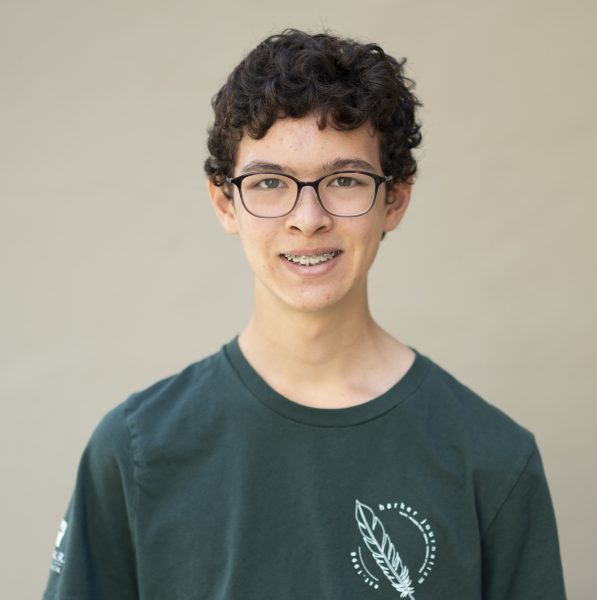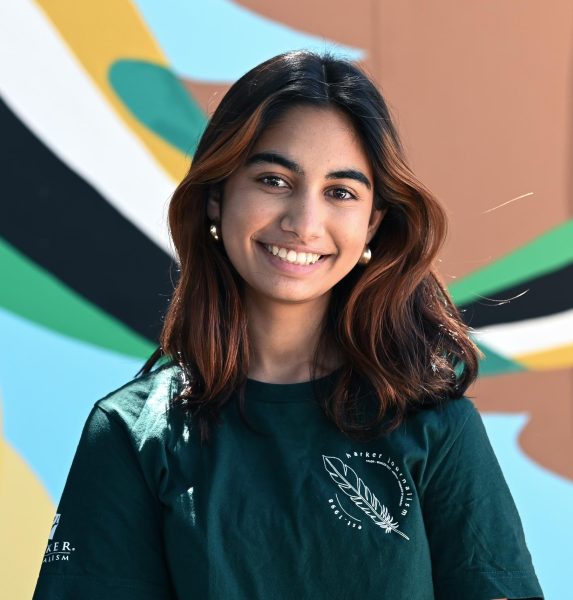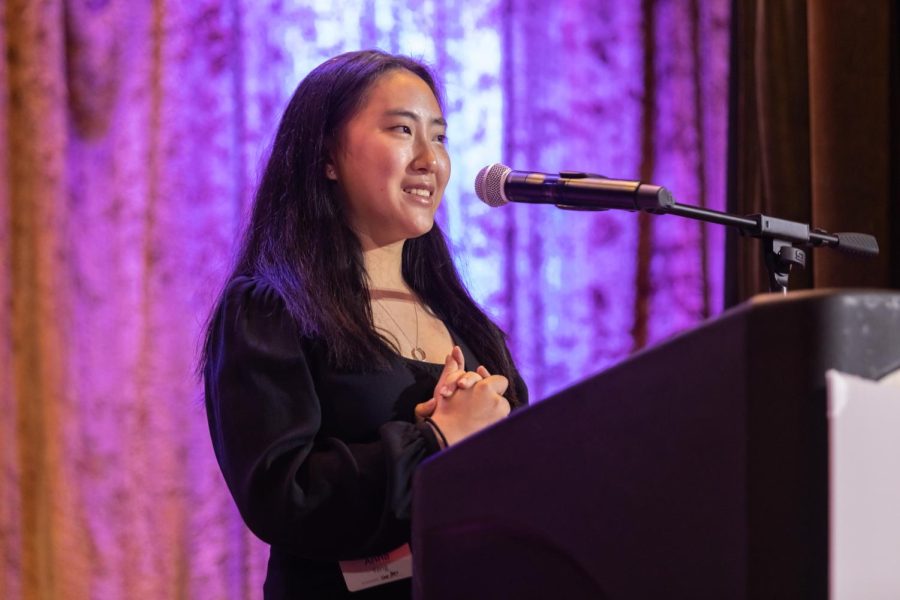The Poet’s Project: ‘Depths of my mind’
Poet Anna Yang delves into herself and her culture through poetry
Provided by Anna Yang
Anna Yang is a twelfth grader at Notre Dame High School in San Jose and is the 2022-2023 Santa Clara Youth Poet Laureate. Anna’s writing has been published in The New York Times and KQED. Anna spoke with Harker Aquila about her experiences in poetry, and how it relates to her identity and past.
Anna Yang is a twelfth grader at Notre Dame High School in San Jose and is the 2022-2023 Santa Clara Youth Poet Laureate. Anna’s writing has been published in The New York Times and KQED. Anna spoke with Harker Aquila about her experiences in poetry, and how it relates to her identity and past.
I was a very big writer when I was a kid. As long as I can remember, from kindergarten to now, I was writing short stories, diary entries. I was a very shy, introverted kid when I was growing up, so poetry was my way of giving myself to the world. I started writing poetry in fourth grade. My fourth grade teacher taught us about writing poetry — it was a really interesting class, and I really loved it. That was the first time that I was taught that I could write poetry, instead of just reading it. After I wrote my first poem, I just really loved it, so I kept writing. I really love how poetry sounds nice. You can say it out loud, and it just fits perfectly, the rhythm and the cadence.
I like to talk about myself in my poetry, and what I see around me and my life. It’s a really great way of centering my mind, and putting it onto a piece of paper. I can come back to it, and then I’ll remember exactly how I was feeling in that moment and what was going on in my life. I put so much of my heart into my poetry, especially when I was very young. I was very attached to my poems, I was very protective. When I read it, I can almost put myself in that young Anna’s shoes, and feel what I was like when I was writing this poem, the headspace I was in. I can relive that day, or that week, or the year where I wrote the poem. It’s a time capsule.
I like to write about my life. If something big happens, or something little, then I feel like, “Oh, I could write a poem about that.” That’s where I get my ideas. It doesn’t always work out. It’s not always good. But I like to look back on those bad poems, and then be like, “Look how I’ve grown.” When I feel stressed, I force myself to write poetry because I know it’s good for my mind. But it’s not always going to come out immediately. Even if you’re a poet, you don’t always know what to write about. As I’ve grown older, my writing also changes. When I was younger, I loved to write about nature, because that’s what I read about. That’s how I saw the world. Now that I’m older, I try to use my poetry with purpose.
If you look at my poetry from recently, it’s all about my culture and grappling with my identity. I thought about going back to China and visiting my family when I was younger and had broken Chinese. I couldn’t really communicate with them at all. I felt like an outcast in the country that my parents grew up in. Having these ties to culture and family, it’s so important in my life, but it was something that I was losing. Now I feel like I write a lot more about my Chinese identity because I don’t want it to go away. I don’t want to lose touch with it.
[I take inspiration from] Victoria Chang and Ocean Vuong. Recently, I’ve been reading Emily Dickinson a lot. I feel like her writing is very beautiful, and I really appreciate her lifestyle as well. Just being in the forest and writing poetry — that’s the dream. One of my favorite books of hers is “The Gorgeous Nothings.” Dickinson didn’t publish any of her poetry, so it’s all of the poetry that she wrote in the moment. Paper scraps, or used envelopes: people scan it and put it into a book, and it’s very beautiful.
I find that a lot of people don’t want to write poetry because it’s “feminine,” or their poetry “isn’t good.” But I just want to say that everyone’s poetry is good, because it came from you. Nobody else can tell you that your poetry is bad, because they don’t understand the history behind it or your story. I’m a very insecure writer, so I don’t want to write about things that other people may have experienced, because I don’t know if it’s true or if I’m misrepresenting. I will always focus on myself because nobody can tell me that my story is wrong.
I want to reach the depths of my mind and pull out everything that I can. Poetry is such a gift, because every single poem is different and every single one will tell you something different, even depending on the person reading it. I want to create something that I feel I put my mind and my soul into, and that others can also read and take something away from that’s powerful for themselves.
A previous version of this article stated that Anna Yang is the 2022-2023 Santa Clara Poet Laureate instead of the 2022-2023 Santa Clara Youth Poet Laureate. The article has been updated on March 16, 2023 to reflect the correction of this error.

Felix Chen (11) is the co-news editor for Harker Aquila and the Winged Post, and this is his third year on staff. Felix hopes to diversify this year's...

Aishani Singh (12) is a Managing editor for Harker Aquila, and this is her fourth year on staff. This year, she looks forward to interacting more with...




![LALC Vice President of External Affairs Raeanne Li (11) explains the International Phonetic Alphabet to attendees. "We decided to have more fun topics this year instead of just talking about the same things every year so our older members can also [enjoy],” Raeanne said.](https://harkeraquila.com/wp-content/uploads/2025/10/DSC_4627-1200x795.jpg)


















![“[Building nerf blasters] became this outlet of creativity for me that hasn't been matched by anything else. The process [of] making a build complete to your desire is such a painstakingly difficult process, but I've had to learn from [the skills needed from] soldering to proper painting. There's so many different options for everything, if you think about it, it exists. The best part is [that] if it doesn't exist, you can build it yourself," Ishaan Parate said.](https://harkeraquila.com/wp-content/uploads/2022/08/DSC_8149-900x604.jpg)




![“When I came into high school, I was ready to be a follower. But DECA was a game changer for me. It helped me overcome my fear of public speaking, and it's played such a major role in who I've become today. To be able to successfully lead a chapter of 150 students, an officer team and be one of the upperclassmen I once really admired is something I'm [really] proud of,” Anvitha Tummala ('21) said.](https://harkeraquila.com/wp-content/uploads/2021/07/Screen-Shot-2021-07-25-at-9.50.05-AM-900x594.png)







![“I think getting up in the morning and having a sense of purpose [is exciting]. I think without a certain amount of drive, life is kind of obsolete and mundane, and I think having that every single day is what makes each day unique and kind of makes life exciting,” Neymika Jain (12) said.](https://harkeraquila.com/wp-content/uploads/2017/06/Screen-Shot-2017-06-03-at-4.54.16-PM.png)








![“My slogan is ‘slow feet, don’t eat, and I’m hungry.’ You need to run fast to get where you are–you aren't going to get those championships if you aren't fast,” Angel Cervantes (12) said. “I want to do well in school on my tests and in track and win championships for my team. I live by that, [and] I can do that anywhere: in the classroom or on the field.”](https://harkeraquila.com/wp-content/uploads/2018/06/DSC5146-900x601.jpg)
![“[Volleyball has] taught me how to fall correctly, and another thing it taught is that you don’t have to be the best at something to be good at it. If you just hit the ball in a smart way, then it still scores points and you’re good at it. You could be a background player and still make a much bigger impact on the team than you would think,” Anya Gert (’20) said.](https://harkeraquila.com/wp-content/uploads/2020/06/AnnaGert_JinTuan_HoHPhotoEdited-600x900.jpeg)

![“I'm not nearly there yet, but [my confidence has] definitely been getting better since I was pretty shy and timid coming into Harker my freshman year. I know that there's a lot of people that are really confident in what they do, and I really admire them. Everyone's so driven and that has really pushed me to kind of try to find my own place in high school and be more confident,” Alyssa Huang (’20) said.](https://harkeraquila.com/wp-content/uploads/2020/06/AlyssaHuang_EmilyChen_HoHPhoto-900x749.jpeg)



